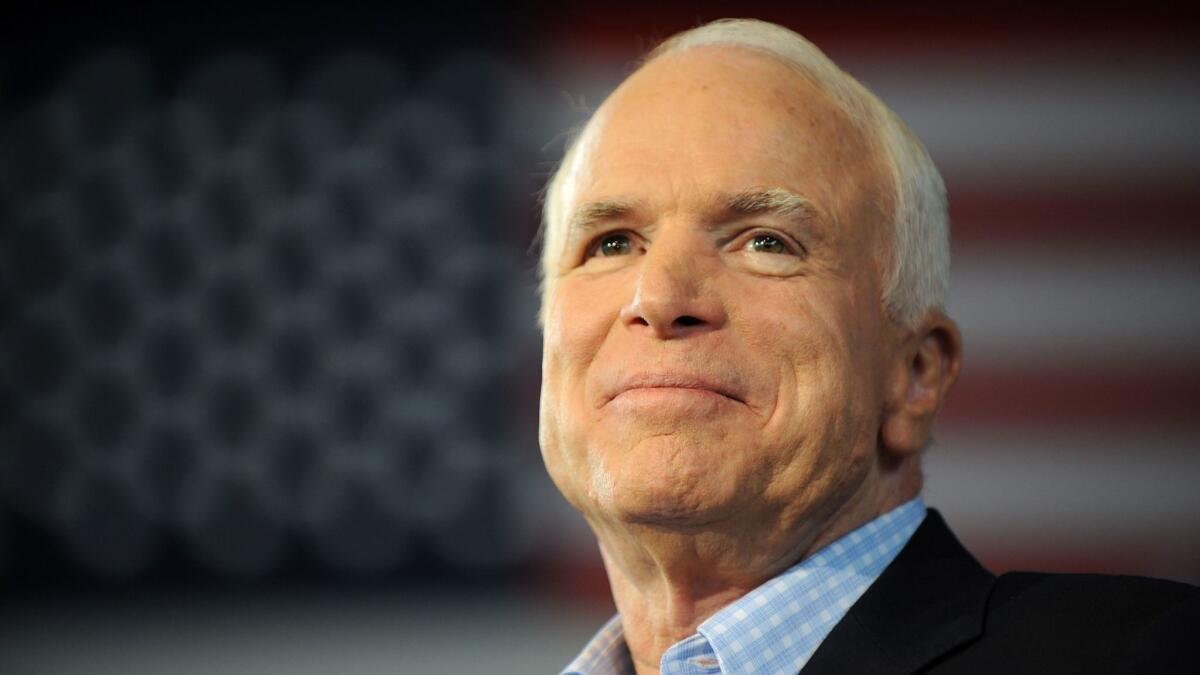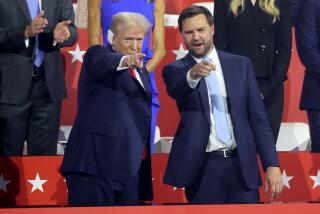Op-Ed: What we lost in John McCain

We are mourning Sen. John McCain this week â most of us, at least â and well we should. But what exactly are we mourning? Why do we feel a sense of loss?
Itâs not that McCainâs politics were universally popular; far from it. Democrats enjoyed his bouts of rebelliousness, but he was never really on their side; he was always a conservative and a hawk. Many Republicans distrusted him; by the end of his life, his partyâs pro-Trump base considered him an apostate.
Nor is it the record of bipartisan legislation he leaves; that record is, in fact, rather thin. His most important achievement, the McCain-Feingold campaign finance law, has been eviscerated by the Supreme Court. Most of his other projects, like immigration reform, ended in failure.
An easy answer is that McCain is an object of reverence for his personal courage, which was considerable when he exerted it, and for his old-fashioned civility in political battle. His concession speech to Barack Obama at the end of the nasty 2008 presidential campaign â âSenator Obama has achieved a great thing for himself and his country.â ⌠â[He] will be my presidentâ â was a model of grace amid disappointment.
But plenty of politicians, even in the age of President Trump, still manage to behave civilly toward their opponents. McCain was more complicated and more interesting.
McCainâs most oddly attractive characteristic: He hated hypocrisy â especially if he was the one practicing it.
What distinguished the Arizonan most was his adherence, worn on his sleeve, to a rigorous code of honor inherited from his father and grandfather, both decorated Navy admirals â combined with his recurring habit of falling short of his own standards and reproaching himself for his failings in public.
Nearly all politicians cut corners on their way to the top. Few of them apologize when they do. (The current president of the United States, who loathed McCain, never apologizes for anything.) None, at least none in recent memory, ever apologized as fully and relentlessly as McCain.
All honest politicians hate the squalid little tradeoffs that politics demands â the favors, the compromises, the truckling to campaign donors. But most of them express their distress in private. McCain felt compelled to express his in public.
In his 2000 campaign for the Republican presidential nomination, for instance, McCain faced a difficult choice in South Carolina. Demands were rising to remove the Confederate flag from the state capitol, and McCainâs first instinct was to agree: âItâs a symbol of racism and slavery,â he said. But after aides told him his position, however admirable, would lose him the stateâs primary, he backed off, saying he âunderstood both sides.â
Months later, after losing, McCain returned to the state to confess his error. âI chose to compromise my principles,â he said. âI broke my promise to always tell the truth.â
In a later memoir, he was even tougher on himself: âI had not just been dishonest. I had been a coward, and I had severed my own interest from my countryâs. That was what made the lie unforgivable.â
That was McCainâs most oddly attractive characteristic: He hated hypocrisy â especially if he was the one practicing it.
It was attractive because it conveyed a larger lesson. In his life and in his words, McCain preached that every American should try to meet the highest standards of honor and valor â but he recognized that no one will always succeed, including himself. The test of character, he argued, was whether you owned up to your errors and spurred yourself to do better.
No wonder he found himself in bitter opposition to Trump, whose standards of honor and valor have proven undetectable.
Soon after Trumpâs inauguration, McCain became the de facto leader of the GOP opposition in the Senate, more willing to condemn the presidentâs offenses against decency and good government than most of his colleagues.
He warned the president against cozying up to Russiaâs Vladimir Putin (âa thugâ), criticized Trumpâs order banning U.S. entry to people from seven mostly Muslim countries (âharmfulâ), and denounced his proposal to tax imports from Mexico (âinsaneâ).
Enter the Fray: First takes on the news of the minute from L.A. Times Opinion Âť
A year ago, McCain cast one of the decisive dissenting votes against his partyâs attempt to repeal Obamaâs healthcare law â not because he wanted to keep the law (he didnât), but because he considered the bill Trump was pushing hopelessly inadequate. The president never forgave him.
And only a few weeks ago, after Trump praised Putin at a summit in Helsinki, Finland, McCain unloaded again.
âNo prior president has ever abased himself more abjectly before a tyrant,â he said.
That was McCain at his best.
After his cancer diagnosis, McCain wrote in his recent memoir that because his career was nearing its end, âIâm freer than colleagues who will face the voters again. I can speak my mind without fearing the consequences much. And I can vote my conscience without worry.â
Have three sadder sentences ever been written about American politics?
Alas, that fully liberated version of McCain was free only for the final 20 months of his career. We are the poorer for that â and that is what we mourn.
Doyle McManus is a contributing writer to Opinion.
Twitter: @DoyleMcManus
Follow the Opinion section on Twitter @latimesopinion or Facebook
More to Read
A cure for the common opinion
Get thought-provoking perspectives with our weekly newsletter.
You may occasionally receive promotional content from the Los Angeles Times.











